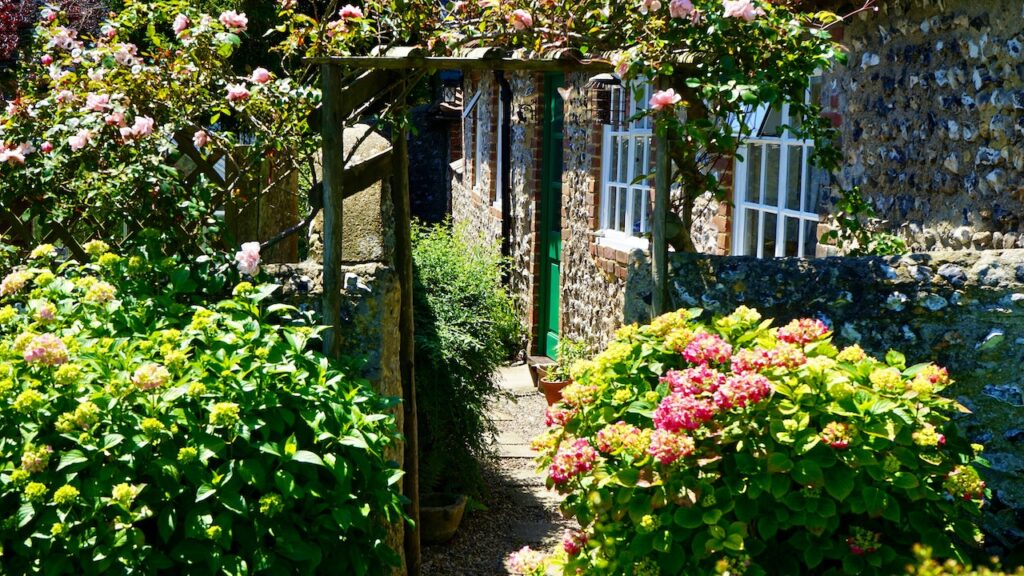Sustainable gardening is a method of gardening that aims to minimise negative impacts on the environment while creating a thriving garden. It involves using environmentally friendly practices that conserve resources, protect biodiversity, and reduce waste.
Sustainable gardening is essential because it helps address some environmental challenges we face. These include issues like climate change, loss of biodiversity, and resource depletion. It also helps to conserve water and promote local food production.

This article covers various tips and ideas for eco-friendly landscaping that can help you create a sustainable garden. We will start by discussing how to design a sustainable garden, including selecting appropriate plants, planning for efficient water use, and creating habitats for wildlife. We will then cover maintenance practices that can promote soil health, reduce waste, and minimise the use of harmful chemicals. We will provide some eco-friendly landscaping ideas, such as rainwater harvesting and using recycled materials. So, get ready to make your garden more sustainable.
Designing A Sustainable Garden
Assessing your site’s soil, light, and water conditions is essential in designing a sustainable garden. Healthy and fertile soil will support healthy plant growth. So it’s important to know what type of soil you have and what nutrients it needs.
You can assess your soil by performing a soil test or observing the plants growing on your site. Knowing how much sunlight your site receives at various times of the day is crucial. As different plants have varying light and shadow needs. This will help you select plants that will thrive in your particular conditions.
Water is a precious resource, so planning for efficient water use in your garden is essential. You can reduce water usage by choosing drought-tolerant plants that require less watering. You can also use mulch to retain moisture in the soil and install a rainwater harvesting system.
Choosing native and drought-tolerant plants is a crucial component of sustainable gardening. Native plants are adapted to the local environment, requiring less water and maintenance. They also provide food and habitat for native wildlife, which can help to promote biodiversity in your garden.
Drought-tolerant plants are also a good choice for sustainable gardening. They require less water and can survive during periods of drought. Drought-tolerant plants include cacti, lavender, and succulents.
Planting for biodiversity and habitat creation is another important aspect of sustainable gardening. By planting various plants that bloom at different times of the year, you can provide food and habitat for pollinators and other wildlife.
You can also create habitat by incorporating birdhouses, bird feeders, and bee hotels into your garden. These features provide shelter and nesting sites for birds and bees, which can help to promote biodiversity and ecological health.
By incorporating these practices into your garden design, you can create a beautiful and thriving garden while minimising negative environmental impacts.
Maintaining A Sustainable Garden
A sustainable garden requires routine maintenance practices that improve soil health, conserve resources, and reduce waste. These practices include mulching, composting, using natural pest control methods, and reducing lawn area and mowing frequency.
Mulching means covering the soil around plants with a layer of organic material such as leaves, straw, or wood chips. Mulch helps to conserve water by reducing evaporation and retaining moisture in the soil. It also helps to suppress weeds, reducing the need for herbicides.
Composting is another important practice for sustainable gardening. Composting involves decomposing organic waste, such as food scraps and yard trimmings, into a nutrient-rich soil amendment. Compost can be used to improve soil health, reduce the need for synthetic fertilisers, and reduce waste.
Using natural pest control methods is also important for sustainable gardening. This involves using biological or mechanical methods to control pests rather than relying on synthetic pesticides. For example, introducing beneficial insects such as praying mantises to control aphids and other garden pests.
Reducing lawn area and mowing frequency is another important aspect of sustainable gardening. Lawns require a lot of water, fertiliser, and energy to maintain, and they provide little habitat or ecological value. By reducing the size of your lawn or replacing it with a garden or native habitat, you can conserve resources and promote biodiversity.
Incorporating the above practices into your gardening routine can help create a healthy and thriving garden. This kind of garden will be in harmony with the environment.
Eco-Friendly Landscaping Ideas
There are several ways you can make your garden more sustainable. You can achieve this by incorporating rainwater harvesting systems, creating a pollinator garden, using recycled and repurposed materials for garden structures and decor, and building a green roof or wall.
One creative way to use recycled materials in your garden is to use railway sleepers as a building material. Railway sleepers are the rectangular wooden beams that are used to support train tracks. They are great for garden structures such as raised beds, retaining walls, or even garden furniture.
You can get durable and weather-resistant ones from a landscape supplier like Suregreen.
Rainwater harvesting systems are an essential feature for sustainable gardens. These systems allow you to collect rainwater from your roof and store it in a tank or cistern for later use in watering your garden. Using rainwater instead of tap water can conserve resources and save money on your water bill.
Creating a pollinator garden is another way to make your garden more sustainable. Pollinator gardens are designed to attract and support various pollinators, like bees, butterflies, and hummingbirds. By providing food and habitat for pollinators, you can help support your garden’s biodiversity and ecological health.
Using recycled and repurposed materials is also an essential aspect of sustainable gardening. In addition to railway sleepers, you can use old containers, pallets, or other materials to create garden structures or decor. This reduces waste and adds character and interest to your garden.
Building a green roof or wall is another great way to incorporate sustainable design into your garden. Green roofs and walls are covered in vegetation and provide numerous benefits, including insulation, stormwater management, and habitat creation. You can further reduce your environmental impact by using recycled materials to construct your green roof or wall.
These practices will benefit the environment and add beauty and interest to your garden.
Summing It Up
Sustainable gardening and eco-friendly landscaping offer many benefits to the environment and our well-being. By choosing native plants, reducing water usage, composting, and using natural pest control methods, we can conserve resources, reduce waste, and create habitats for wildlife. Additionally, incorporating green roofs or walls, rainwater harvesting systems, and recycled materials can further minimise our impact on the environment.
These practices also offer personal benefits, such as a healthier and more beautiful garden, improved air and water quality, and reduced energy costs. We can positively impact the environment and inspire others to do the same by taking steps towards sustainability in our gardens.
So, whether you have a small balcony or a large backyard, there are many ways to make your garden more sustainable. Take action today by assessing your site’s conditions, choosing native and drought-tolerant plants, composting, and using natural pest control methods. When removing waste from your garden, you also want to do this sustainably. Look into garden clearance in Manchester, London or wherever you live for a geo-centric service that can ensure your waste is taken away without causing damage to the environment.
Every small step towards sustainability counts. Together, we can make a big difference in creating a healthier, more sustainable future for ourselves and the planet.

